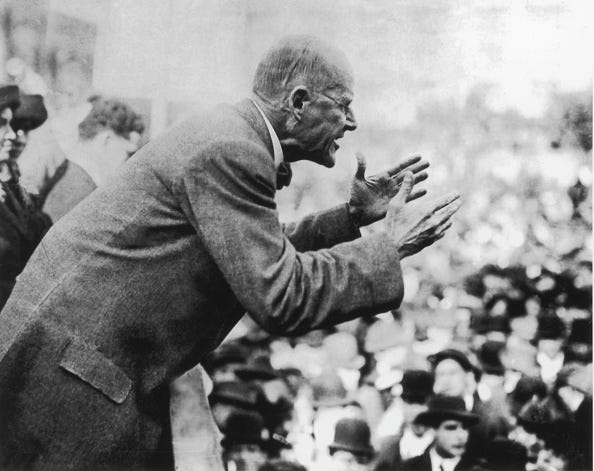The Writer's Almanac from Tuesday, November 5, 2013
"The Book of A" by Wesley McNair, from Talking in the Dark. © David R. Godine, 1998.
ORIGINAL TEXT AND AUDIO - 2013
It's the birthday of runner and writer George Sheehan, born in Brooklyn, New York (1918). He was raised in a Catholic family, the oldest of 14 children. He went to Manhattan College, where he was a track star. In those days, no one ran for recreation, so it was expected that he would quit as soon as college was over. He did, and for many years focused on his medical career. But then he hit a midlife slump. He was a successful, well-known doctor, but even though his family lived in a mansion and appeared happy and prosperous, Sheehan was constantly anxious about his ability to support his wife and 12 children. He started drinking. He said: "I was in middle-age melancholia. I had to pull the emergency cord and get off the train. Before I ran, I was getting bombed every weekend. I didn't smoke because I was too cheap."
One night, he got a middle-of-the-night call from a patient who wanted Sheehan to come over right away. Sheehan thought his patient was being overly dramatic, and he was so frustrated that he punched a hole in the wall and broke his hand. After that, he realized that something had to change in his life. He started reading all the great philosophers, and he was particularly inspired by Irenaeus, who said that the glory of God was man fully alive. Sheehan decided that he would go back to running.
Since no one ran in public, Sheehan started out running in circles around his backyard — it took 26 trips around the yard to go one mile. Finally, he started running on the roads, in a ski mask and long johns. When Sheehan started running again, he was 45 years old. Five years later, he set a world record for his age group with a mile of 4 minutes and 47 seconds. He ran 50 marathons, including 21 consecutive Boston Marathons. His local newspaper, the Red Bank Register, offered to send Sheehan to the Olympics in Mexico City so that he could report on it. They liked his piece, and asked if he would write a weekly column about running. He said yes, and it was picked up by Runner's World magazine, and he continued the column for 25 years.
When Sheehan started running again in the mid-1960s, amateur running was pretty much unheard of. By the late 1970s, 30 million Americans were running for recreation.
Sheehan wrote many books, including Dr. Sheehan on Running (1975), Running and Being (1978), and Personal Best (1989). Sheehan struggled with cancer in the final years of his life, and his final book, Going the Distance (1996), was about the experience of dying and was published after his death.
Today is the birthday of speaker and labor organizer Eugene Debs, born to poor Alsatian immigrants in Terre Haute, Indiana (1855). At the age of 14, Debs left high school to work as a paint scraper on the railroad. He soon joined the Brotherhood of Locomotive Firemen, became an influential member of the union, and went on to become editor of their national magazine. He first went to prison for support of the Pullman Strike of 1894. He emerged six months later a committed socialist, a charismatic speaker, and in 1900, ran for president on the Socialist ticket. He also co-founded the Industrial Workers of the World (the Wobblies) alongside Bill Haywood and Mother Jones.
A tall lanky man with piercing blue eyes, Debs was an animated speaker, often bending far over the podium to look into the faces of the crowd. He disliked the label of leader, saying: "Too long have the workers [...] waited for some Moses to lead them out of bondage. I would not lead you out if I could; for if you could be led out, you could be led back again. I would have you make up your minds that there is nothing you cannot do for yourselves."
In 1908, Debs campaigned for president on "The Red Special" locomotive, traveling to the farthest corners of the country. He lost yet again, but this time he received more than a million votes. Nine years later, he was sentenced to 10 years in prison for a speech in which he said, "The rich start the wars, the poor fight them." The Espionage Act had recently passed, making it a crime to publicly oppose the American involvement in World War I. Debs represented himself, called no witnesses, and his statement before the court is regarded as a masterpiece of American oratory.
From an Atlanta penitentiary, he continued to speak out on labor issues, and he ran yet another popular presidential campaign from behind bars. Now in his early 60s, he refused any special treatment in jail and won over his fellow inmates by constantly fighting on their behalf. When he was pardoned on Christmas Day in 1921, the warden opened every cell block and allowed more than 2,000 inmates to gather at the gates and bid farewell to Debs. As he turned the corner and began to walk the gantlet of prisoners, Debs opened his arms to the men and began to weep as the crowd roared. Some 50,000 people greeted him upon his return to Terre Haute.
His book on the prison industry, Walls and Bars, was published after his death from heart failure in 1926.
Eugene Debs, who said: "While there is a lower class, I am in it. While there is a criminal class, I am of it. While there is a soul in prison, I am not free."
Be well, do good work, and keep in touch.®
Cheerfulness by Garrison Keillor
In Cheerfulness, veteran radio host and author Garrison Keillor reflects on a simple virtue that can help us in this stressful and sometimes gloomy era. Drawing on personal anecdotes from his young adulthood into his eighties, Keillor sheds light on the immense good that can come from a deliberate work ethic and a buoyant demeanor.





